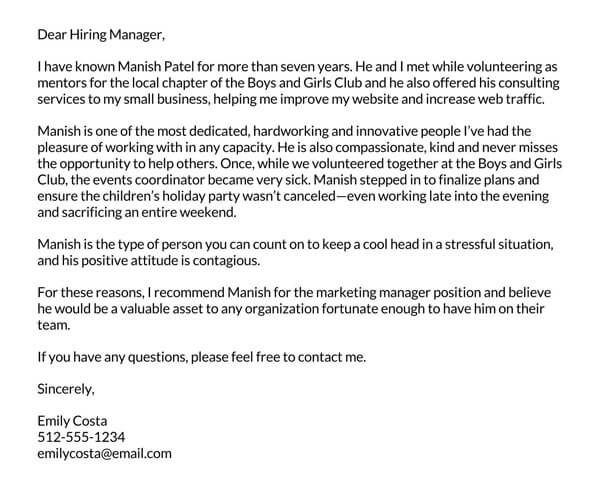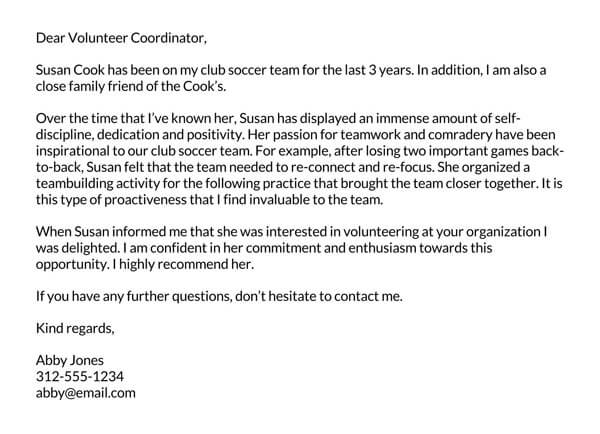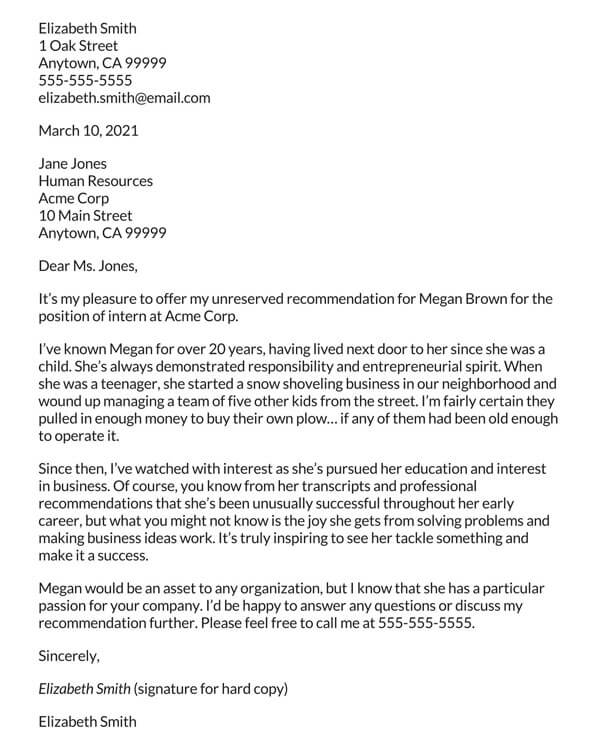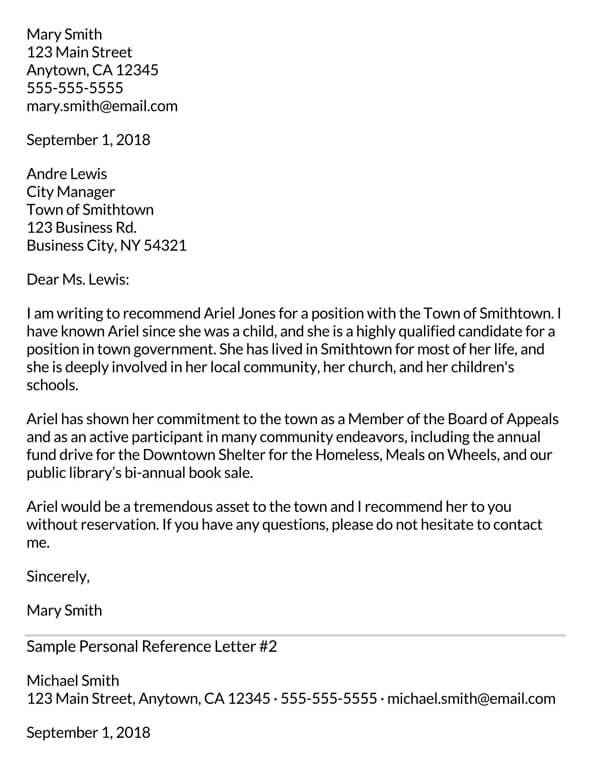It is a reference letter written on behalf of a job applicant by recommenders who could be friends, business acquaintances, teachers, and neighbors to attest to the skills or character of the applicant on a personal level.
It provides information concerning the applicant’s skills, qualifications, attitude, and character based on the opinion of the recommender, to help the employer decide whether to hire the applicant.
The purpose of it is to heighten the chances of a candidate getting a job by introducing them to their potential employers by pointing out their best traits, skills, and personalities and stating why they are qualified for the job.
Sample Letters and Examples




When are Personal References Necessary?
These letters are requested from people who know a candidate outside of work on a very personal level and can attest to their character and abilities. Usually, when you are applying for a job, you will most likely be required to present it, and this occurs when seeking higher positions, like a managerial position.
If you are a recent graduate or you are changing your career, you may be required to submit a character reference that will provide insight into your capabilities and work ethics, specific to the position you are applying for, that a former colleague or employer may be familiar with.
When applying for a job, make sure you pay close attention to the type of references the employer is seeking. Be sure it’s stated clearly that a personal or professional reference letter is required.
Such references are usually required for a major purchase like a house, or for education (mainly postgraduate) applications. For example, lawyers seeking admission to the bar are asked for a personal reference; also, these letters are required by other professional associations and certification bodies.
High school and college students with no work experience applying for jobs and volunteer positions, or scholarships, are asked for a character reference in place of a professional reference. These references can be obtained from a pastor, teacher, guidance counselor, or any adult who is familiar with the student’s personality and achievements.
Writing a Personal Reference Letter
It should be written by someone who has relations with or has previously worked with the candidate to be able to share information about the candidate. When writing it, the following details should be captured:
Step 1: Letterhead
A letterhead serves as the heading of this letter and it consists of the name, address, logo, if any, and contact information of the recommender. The letterhead information is written at the top and placed either on the left or right side of the letter.
There are two conditions applied when writing a letterhead:
- If the reference letter is sent via postal address, then the contact information of the recommender, date and contact information of the recipient should be written at the top as the letterhead.
- If the reference letter is mailed to the recipient, then the recommender does not need to include the contact information or date at the top of the letter, instead, the recommender should list their contact details after the signature at the bottom of the letter.
Step 2: Salutation
A salutation in a reference letter is a formal greeting addressing the recipient, written immediately below the letterhead. If the person writing the letter does not know the recipient on a personal level, then the candidate on whose behalf the letter is written should provide the name of the person to whom the letter should be addressed if they know. The section should include the title, such as Dear Mr./Mrs./Ms., followed by the surname of the recipient.
Step 3: Body paragraphs
After the salutation, the next section of the reference letter is the body paragraphs, where the reason for writing the letter is mentioned. The paragraphs explain to the recipient or potential employer the traits of the candidate for whom the letter is written on behalf of the recommender.
3.1 Describe the relationship with the candidate
The recommender should begin the reference letter by first stating their relationship with the candidate they aim to represent in the letter. The details of their relationship should be captured in terms of whether they are former colleagues, former bosses, friends, neighbors, or relatives of the applicant.
EXAMPLE
I was Mr. Aron’s former supervisor at Bilden’s Organization where Aron worked as a finance intern in the finance department.
3.2 Mention the period of knowing each other
The recommender should indicate the period in which they have known the person they are recommending. This should be mentioned in the body paragraph so the potential employer gets a clear understanding of the length of the relationship between the recommender and the applicant, which increases the applicant’s chances of getting employed.
EXAMPLE
A recommender can mention the period of them knowing the applicant for whom they are writing a recommendation letter by stating:
I have known Mr. Aron for the period we worked together in the finance department for 4 years.
3.3 Explain qualities with examples
A recommender writing a reference letter is required to share in the body paragraph section the candidate’s qualities; this can include what the candidate is best at without exaggerating their traits. The recommender should mention how the individual has applied their skills to achieve certain goals or how they were able to deal with challenges and come up with a solution that impacted their work positively.
EXAMPLE
The recommender can state the qualities of an applicant like this:
During the period Mr. Aron served as a finance intern, he demonstrated strong leadership skills, effective communication skills, and active participation in teamwork.
3.4 Summarize with a recommendation
The recommender should conclude the last paragraph by summarizing the traits of the applicant and recommending them for the job. The summary part should include specific reasons as to why the candidate is a suitable fit for the organization they wish to work for. The recommendation part should be as specific as possible, since this is the main area that various organizations focus on when reading the reference letter.
EXAMPLE
It should end with a summary of a recommendation statement by the recommender, as follows:
I trust that Mr. Silas is capable of handling the job position because of their articulate skills in leadership, management, and communication that make them an ideal candidate for the job.
Signature and contact information
The signature and contact information of the recommender or person writing the letter should be placed at the bottom. The details are used as a means of validating the information written in the letter. In addition, contact information is included to assist the organization in reaching the person who made the recommendation in cases where they may need clarifications regarding the candidate.
EXAMPLE
Yours sincerely,
Name of (recommender)
Signature
Personal Reference Letter Template
[Your Name]
[Your Position/Relationship to the Recipient, if applicable]
[Your Address]
[City, State, Zip Code]
[Your Email Address]
[Your Phone Number]
[Date]
[Recipient’s Name or “To Whom It May Concern,” if the recipient’s name is unknown]
[Recipient’s Position/Title, if known]
[Company/Organization Name, if applicable]
[Address, if known]
[City, State, Zip Code]
Dear [Recipient’s Name or “To Whom It May Concern”],
I am writing to wholeheartedly recommend [Name of the Person You’re Recommending], whom I have known for [number of years or in what capacity, e.g., as a friend, neighbor, or colleague]. It is a genuine pleasure to write this letter on their behalf. [Name] is a person of outstanding character, who has consistently demonstrated qualities such as [list qualities, e.g., reliability, kindness, honesty, and diligence] throughout the time I have known them.
[In the next paragraph, provide a specific example or story that illustrates the person’s character or achievements. This could be related to how they handled a challenging situation, contributed to a community project, or supported others in need. Make sure to highlight how their actions reflect their qualities and why it makes them suitable for the opportunity they are seeking.]
[Name] has always shown an incredible ability to [mention a skill or trait, such as problem-solving, leadership, or communication], which I believe will make them an excellent fit for [mention the opportunity, e.g., a job, volunteer position, or educational program]. Their [mention another trait or skill, such as empathy, creativity, or work ethic] has not only benefitted those around them but has also inspired others to strive for better.
Moreover, [Name]’s dedication to [mention any relevant activities, hobbies, or interests] showcases their [mention qualities such as passion, commitment, or versatility]. This aspect of their personality not only speaks to their well-rounded character but also to their ability to balance and excel in various endeavors.
In conclusion, I have no reservations in recommending [Name of the Person You’re Recommending] for [mention the specific opportunity]. I am confident that they will bring the same level of excellence, dedication, and positive spirit to this new opportunity as they have in all their previous undertakings. [Name] is truly a remarkable individual, and I believe they will make a significant contribution to your [organization, team, program, etc.].
Should you require any further information or wish to discuss [Name]’s reference in more detail, please do not hesitate to contact me at [Your Phone Number] or via email at [Your Email Address].
Thank you for considering this recommendation. I am looking forward to the opportunity to see [Name of the Person You’re Recommending] succeed in this new chapter and am confident that they will exceed your expectations.
Sincerely,
[Your Name]
[Your Signature, if sending via mail]
[Your Position/Relationship to the Recipient, if applicable]
Sample Personal Reference Letter
To Whom It May Concern,
I am writing with great pleasure to recommend David Kim, a distinguished individual I have known for over five years through our mutual involvement in the Hometown Community Center volunteer programs. As the Community Volunteer Coordinator, I have had the privilege of observing David’s remarkable contributions, his unwavering commitment to service, and his exemplary character. David embodies the spirit of community and kindness, making him an outstanding candidate for any position or endeavor he chooses to pursue.
David first joined our volunteer program as a high school student looking to make a difference in his local community. From the outset, David demonstrated a profound sense of responsibility and a compassionate heart. One particular instance that stands out is when David initiated a project to refurbish the local park. Not only did he organize the effort, securing donations of materials and rallying volunteers, but he also worked tirelessly alongside his peers, painting, planting, and cleaning to ensure the project’s success. This initiative not only revitalized a community space but also encouraged a sense of pride and unity among the residents of Hometown.
Beyond his leadership abilities, David’s kindness and empathy shine through in his interactions with others. He has a unique talent for making people feel seen and heard, whether he’s mentoring young volunteers or coordinating with city officials. His genuine care for people and his ability to connect on a personal level have made him a beloved member of our community.
David’s dedication to service is matched by his integrity and reliability. He approaches every task with diligence and a positive attitude, no matter how challenging it is. His commitment to excellence and his willingness to go above and beyond have left a lasting impact on our community center and the people we serve.
In summary, David Kim is a remarkable young man whose contributions to our community have been invaluable. His character, combined with his passion for making a positive impact, makes him an ideal candidate for any role he seeks to undertake. I am confident that David will continue to excel and inspire those around him, just as he has done in Hometown.
Please feel free to contact me at (555) 678-1234 or via email at maria.gonzalez@email.com if you would like to discuss David’s reference further. I am more than happy to provide additional information.
I appreciate your consideration of this recommendation. I have no doubt that David Kim will bring the same level of commitment, kindness, and excellence to your organization as he has to ours.
Sincerely,
Maria Gonzalez
Community Volunteer Coordinator
Analysis
The recommendation letter presents a compelling endorsement of the individual’s character and contributions to the community. It establishes a personal connection between the writer and the individual, lending credibility to the recommendation. Through specific examples, such as the initiative taken in organizing a park refurbishment project, the letter vividly illustrates the individual’s leadership, organizational skills, and dedication to community service. Additionally, the letter highlights admirable character traits such as kindness, empathy, integrity, and reliability, which are deemed essential for success in any endeavor. By emphasizing the positive impact of the individual’s actions on the community, the letter demonstrates their ability to effect change and inspire others. Contact details provided for further inquiries indicate the writer’s willingness to provide additional information or discuss the individual’s reference. Ultimately, the letter expresses confidence in the individual’s potential for success in any role they pursue, making a strong case for their suitability for future opportunities.
Personal Vs Professional Reference Letter
Unlike a professional reference, a personal reference does not really need to come from someone you have worked with directly. A personal reference should come from someone who knows you well enough to provide a very good insight into your personality and character. The letter must include your relationship with the person and how long you’ve known each other.
Always make sure that you are sure of what has been asked for, whether it’s a professional or personal reference. Generally, any person who can vouch for your ability to achieve, your ethics, and your reliability, can give you a personal reference for an employment application or academic pursuit.
Who Can Write a Personal Reference Letter?
The range of people who can write this letter – teachers, professors, religious workers, friends, coaches, business associates, neighbors, etc.
Remember not to write for family members or spouses to provide a personal reference.
Make sure you do not write for someone about whom you know very little. A vague or very general description of the applicant will negatively affect their chances of getting a job or admission.
Tips for Writing Reference Letters
The purpose of writing a reference letter on behalf of an applicant is to help them secure the job. Hence, it is important to follow the correct format to deliver it effectively, which inspires a positive attitude from the recipient or employer.
Below are essential tips for writing it:
- Think before saying Yes: It highly influences the perception of the employer regarding whether they should give the applicant a job or not. When asked by an applicant to help them write the reference letter, one should think about determining if they have the proper knowledge of the applicant to write an honest review. The person writing the recommendation has a right to politely refuse to write the letter if they feel uncomfortable attesting to the applicant’s traits and qualifications.
- Follow Business Formal Format: It is a document that is meant for official use, and as such, it should follow a formal business format. The official business format, in this case, should be used since it is a document that a potential employee uses when applying for a job. The skill or ability to follow the formal format is checked by potential employers while shortlisting candidates who have applied for a job in that organization.
- Focus on the Job Description: While writing it, the recommender should focus on the candidate’s job in an organization. They should review the job description to help them discuss relevant skills to give a candidate better chances of acquiring the job they have applied for.
- Sound Positive: The person who writes the reference letter should use a positive tone to describe the candidate’s capabilities and increase their chances of getting hired. The idea is to write down the most attractive traits of the applicant to have a positive attitude from the employer toward the applicant.
- Focus on one or two traits: The employer’s time is vital to consider when writing a reference letter, and the idea is to capture their attention as fast as possible to increase the chance of the applicant getting the job. Therefore, a recommender should focus on two positive traits of the applicant that would increase their chances of being preferred for the job.
- Must add Specific Examples: In addition to keeping things formal, the person who writes the reference letter should include several positive examples of the skills that the candidate is good at. The skills mentioned in the letter should be accompanied by practical examples of actual accomplishments the applicants have achieved personally or professionally.
- Keep it Short: It should be short and straight to the point because employers have multiple/several applications to read. Hence, the recommender should choose the most relevant information possible and present it in an appropriate manner so that the chances of the applicant’s letter being read by the hiring manager increase, as it will boost the chances of the applicant getting that job.
- Avoid private /personal details: Private details have a way of stimulating biases and this letter, being a formal document, should avoid personal details about the candidate. Some of these details may include a condition that the candidate has or some of the struggles they may be going through. While the person writing the reference letter may have good intentions, an organization may see this as a weakness when it comes to the capabilities of the applicant carrying out their duties.
- Follow the submission instructions: Various submission guidelines are put in place for submitting such letters. The guidelines may vary from one organization to another, and as such, it is important to ensure that the protocols are followed to avoid the disqualification of a candidate.
Some of the submission details may include issues such as when the reference letter should reach the organization that the candidate is interested in working in. It is important to ask the applicant how and when the reference letter should reach a particular organization to avoid the possibility of the applicant missing out on the opportunity to be selected for the job interview
Conclusion
A personal reference letter is a document written on behalf of an applicant highlighting their strengths and traits that are attractive to an organization to increase their chances of getting the job. Writing a brief, relevant, and informative reference letter on behalf of an applicant is essential to help increase their chances of getting employed. Emphasis on specific skills such as team player, leadership, or patience helps in capturing the attention of the recruiting team.





















